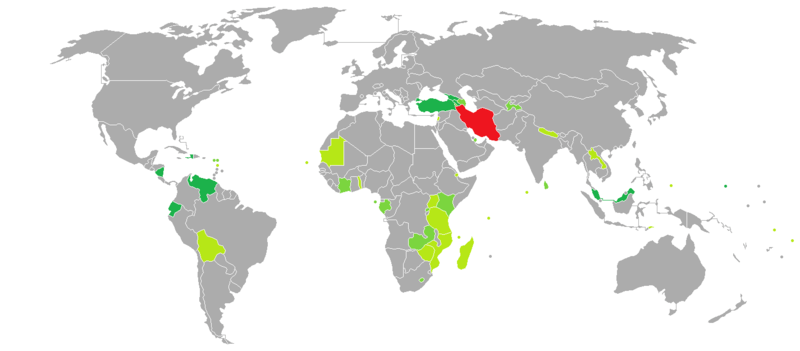Iranian nationality law
Iranian nationality law contains principles of both jus sanguinis and jus soli. Children acquire nationality of Iran through their fathers, but not their mothers.[1] The full nationality law is defined in Book 2 of the Civil Code of Iran, Articles 976 through 991.[2]
Definition of Iranian nationals
Article 976 of the Civil Code of Iran defines who is an Iranian national:[3]
- All persons residing in Iran except those whose foreign nationality is established; the foreign nationality of such persons is considered to be established if their documents of nationality have not been objected to by the Iranian Government.
- Those born in Iran or outside whose father is Iranian.
- Those born in Iran of unknown parentage.
- Persons born in Iran of foreign parents, one of whom was also born in Iran.
- Persons born in Iran of a father of foreign nationality who have resided at least one more year in Iran immediately after reaching the full age of 18; in other cases their naturalization as Iranian subjects will be subject to the stipulations for Iranian naturalization laid down by the law. New legislation passed by the Iranian Parliament in 2012 grants permanent residency to children born to Iranian mothers and foreign fathers.[4]
- Every woman of foreign nationality who marries an Iranian husband.
- Every foreign national who has obtained Iranian nationality.
Multiple citizenship
In practice, the Iranian government considers dual citizens as Iranian citizens only.[5] Nevertheless, article 977 of the Civil Code of Iran deals with multiple citizenship. As a consequence of Paragraphs 4 or 5 of Article 976, some Iranian minors may have multiple citizenship. If they wish to retain the non-Iranian nationality after age 18, they have to inform Iran's Ministry of Foreign Affairs.[6]
Travel freedom

In 2016, Iranian citizens had visa-free or visa on arrival access to 37 countries and territories, ranking the Iranian passport 98th in the world according to the Visa Restrictions Index.
See also
Notes
References
- Birth Registration in Iran: An analysis of the state of relevant laws in Iran (PDF), Iran Information Series, UNICEF, 2005, retrieved 2009-10-20
- Civil Code of Iran (last amended 1985), Refworld, United Nations High Commissioner for Refugees, 2009, retrieved 2009-10-20